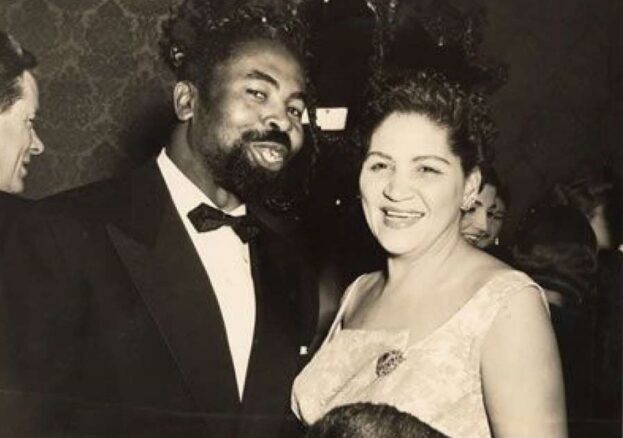
Pearl Cynthia Nunez, later known as Pearl Connor-Mogotsi, was born on 13 May 1924, in Diego Martin, Trinidad. She was the ninth of twelve children born to Albert Antonio Nunez and Georgina Agnes Fitt. Growing up in Trinidad, Pearl received her education at a convent school in Port of Spain. Her family, well-educated and of mixed-race heritage, exposed her to the arts and the rich folklore of the Caribbean.
Pearl’s early exposure to literature, music, and drama, combined with a British-style education, kindled her passion for the theatre. Her first experience in performance took place at the Little Carib Theatre, which was founded by Beryl McBurnie, a significant influence on her artistic journey.
Life in London
In 1948, Pearl met and married Edric Connor, a Trinidadian folk-singer and actor, in England. She had initially traveled to the UK to study law at King’s College, London University, but she deferred her studies to manage her husband’s career. This decision would set her on a path towards cultural activism and advocacy.
In 1956, the couple began an agency for black artists, The Edric Connor Agency, which in the 1970s would be renamed the Afro-Asian-Caribbean Agency, representing people from the Caribbean, Malaysia, India, and Africa across all art forms. Pearl’s agency represented numerous prominent figures, including actors, dancers, musicians, and writers. Her work helped provide opportunities for black and minority ethnic artists in the UK, contributing to the diversification of the arts and entertainment industry.
Pearl Connor-Mogotsi herself trained at the Rose Bruford College of Speech and Drama and was a broadcaster for the BBC General Overseas Service, working for their Caribbean Service and in radio plays on the Corporation’s domestic networks. Her performances included works like “The Barren One” (1958), “My People and Your People” (1959), and Jan Carew’s “The Riverman” (1968). Additionally, she occasionally acted on stage and in television or film roles, including a cameo in Lindsay Anderson’s “O Lucky Man!” (1973).
World War II and the West Indian Emergency Committee (WIEC)
The outbreak of World War II brought significant changes to the Caribbean and its diaspora communities. During this transformative period, Pearl Connor-Mogotsi emerged as a pivotal figure in the West Indian Emergency Committee (WIEC), established in the United Kingdom to provide support to West Indian soldiers and their families.
Within the WIEC, Connor-Mogotsi’s contributions were instrumental. Her exceptional skills in communication and advocacy enabled her to draw attention to the challenges faced by West Indian servicemen and their families. Her radio broadcasts on the BBC played a crucial role in raising awareness about the valuable contributions and sacrifices made by West Indian soldiers during the war.
Cultural Activism and the Negro Theatre Workshop
In 1961, Pearl Connor-Mogotsi was integral in setting up one of the first black theatre companies in Britain, the Negro Theatre Workshop (NTW), and co-founding the West Indian Theatre Trust to support it. The NTW emerged after a meeting at the Mercury Theatre, Notting Hill Gate, with a number of black actors and writers. Rehearsing at the West Indian Students’ Centre in Earls Court and the newly opened Africa Centre in Covent Garden, the NTW launched in November that year with a production of “A Wreath for Udomo,” adapted by William Branch from the novel by Peter Abrahams. Another notable NTW production was of Wole Soyinka’s “The Road” (1965), which was first staged for the Commonwealth Arts Festival.
Pearl Connor-Mogotsi was also a member of the Caribbean Artists Movement (CAM) and the Campaign Against Racial Discrimination (CARD) during the 1960s.
Cultural Activism and Marriage to Joe Mogotsi
Following Edric Connor’s passing in 1968, she continued her cultural activism. In 1971, she married Joe Mogotsi, the leader of the South African singing group The Manhattan Brothers. Together, they organised tours throughout the world for black South African artists and co-authored the book “Mantindane – ‘He Who Survives’: My Life with the Manhattan Brothers” (2002).
Recognition and Later Years
Pearl Connor-Mogotsi’s contributions to the immigrant community in the United Kingdom were recognized when she received Trinidad and Tobago’s Hummingbird Silver Medal in 1972. Her tireless efforts to promote African Caribbean arts and provide opportunities for black artists left a lasting impact on the cultural landscape of the UK.
In 1992, she was featured in the BBC television documentary “Black and White in Colour,” which examined the contribution of black and Asian people to British television history. In 1995, Connor opened the 12th International Book Fair of Radical Black and Third World Books in London.
On 20 January 1997, she gave the first talk in the “Life Experience With Britain” series of talks and conversations at the George Padmore Institute in London.
Passing and Legacy
Connor Mogotsi died, aged 80, on 11 February 2005 in Johannesburg, South Africa, where she had gone with Mogotsi for the premiere of the film “Sophiatown.” Her funeral took place at St Martin’s Church, Kensal Green, on 26 February.
The Edric and Pearl Connor Papers, 1941–1978, were donated to the Alma Jordan Library at the University of the West Indies, St Augustine, Trinidad & Tobago, and a collection of additional related items is housed in the Schomburg Center for Research in Black Culture.
Pearl Connor-Mogotsi’s life story serves as an inspiration to future generations, illustrating the transformative power of the arts and cultural activism in fostering social change, celebrating diversity, and amplifying underrepresented voices.
